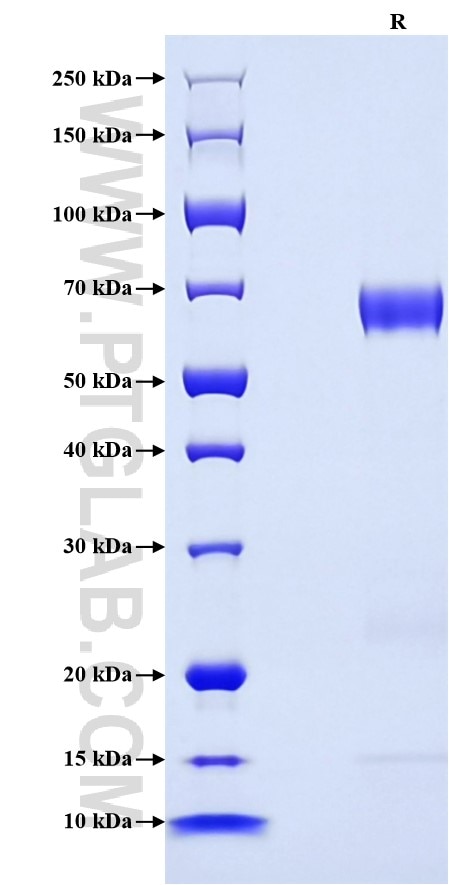Recombinant Human KLK9 protein (rFc Tag)
Species
Human
Purity
>90 %, SDS-PAGE
Tag
rFc Tag
Activity
not tested
Cat no : Eg2779
Validation Data Gallery
Product Information
| Purity | >90 %, SDS-PAGE |
| Endotoxin | <0.1 EU/μg protein, LAL method |
| Activity |
Not tested |
| Expression | HEK293-derived Human KLK9 protein His16-Asn250 (Accession# Q9UKQ9-1) with a rabbit IgG Fc tag at the C-terminus. |
| GeneID | 284366 |
| Accession | Q9UKQ9-1 |
| PredictedSize | 52.0 kDa |
| SDS-PAGE | 60-70 kDa, reducing (R) conditions |
| Formulation | Lyophilized from 0.22 μm filtered solution in PBS, pH 7.4. Normally 5% trehalose and 5% mannitol are added as protectants before lyophilization. |
| Reconstitution | Briefly centrifuge the tube before opening. Reconstitute at 0.1-0.5 mg/mL in sterile water. |
| Storage Conditions |
It is recommended that the protein be aliquoted for optimal storage. Avoid repeated freeze-thaw cycles.
|
| Shipping | The product is shipped at ambient temperature. Upon receipt, store it immediately at the recommended temperature. |
Background
KLK9, or kallikrein-related peptidase 9, is a member of the human kallikrein-related peptidases family, which is the largest family of secreted serine proteases. These enzymes have diverse expression patterns and physiological roles, and their aberrant activity has been linked to various pathologies such as respiratory diseases, neurodegeneration, skin-barrier dysfunction, and cancer. The serum level of KLK9 has also been suggested to have the potential to be used as a biomarker for asthma. The KLK9 gene was also found to be regulated by steroid hormones, mainly estrogens and progestins, in cancer cell lines.
References:
1. Filippou P, et al. (2017). Clin Proteomics.17;14:4. 2. Yousef GM, et al. (2003). Breast Cancer Res Treat. 78(2):149-58.

